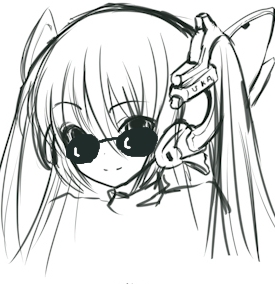
Written by A. H. on 25 Feb 2014
If you were to ask us to name an anime director who has produced some of the most thought-provoking content of recent years, there's a very good chance that Yasuhiro Yoshiura's name would be close to - if not at - the top of that list. From his self-produced Aquatic Language through to Pale Cocoon and onwards to perhaps his best-known work Time of EVE, Mr Yoshiura has channelled questions and concepts raised by classic science fiction and brought them to the animated medium in a superb and thoughtful fashion.
Now, the director has turned his attention to what is perhaps his most mainstream work yet, Patema Inverted - following a late February screening in Edinburgh and with a limited cinema release scheduled for May 2nd 2014, we sat down with Mr Yoshiura to talk about his life and work thus far.
First of all, welcome to the UK! We understand this is your first time here, have you had an opportunity to visit anywhere particular?
Yasuhiro Yoshiura: I actually just arrived in London this morning from Edinburgh, so all I've done so far is check into the hotel, have lunch and come here!
Starting right at the beginning, what were your interests and influences growing up as a child and teenager that you feel has informed your creative works?
Yoshiura: I liked creating things as a child, and at primary school over the holidays we had a research project where we could do whatever we liked - I wrote a novel, so I've liked writing stories since then. The story I wrote was actually completely copied from German children's fiction author Michael Ende!
That partly answers our next question; was writing and directing always something that you aspired to as a career, and more specifically did you always want to work with animation?
Yoshiura: It wasn't anime I was interested in specifically - I like drawing, I got hooked on theatre at one point, and I just like expressing myself. So, it wasn't particularly anime or film, but anime came along later.
Your most notable early work was the self-produced Aquatic Language, which seems like a very early, formative version of Time of EVE in a number ways - what do you feel you learned from the experience of creating that short film?
Yoshiura: Yes, that was an independent project that I made as a student, and at the time I was very much involved in plays and theatre at the same time as animation, as I just mentioned - I did a lot of acting at university. So, I wanted to animate a play, and if you've seen Aquatic Language there are various people having conversations in one single shop - the idea was that I thought it would work as an animated series, and then I expanded upon it, which is where Time of EVE came from.
When it came to creating Time of EVE then, did you have any specific goals in mind in terms of its themes, or ideas and questions that you wanted to present to the viewer?
Yoshiura: Time of EVE was born out of restrictions - I was asked to make an animated series, but I was an independent director and I had to work within certain limits. I thought that by setting everything in one location, rather than having the camera moving around all over the place, that it would require less energy. Time of EVE was born out of those restrictions that I had.
When I tried to think of what story would work within those restrictions, I came up with the robot themes from Isaac Asimov's novels, and that's how it all started. So rather than having the theme just to begin with, it was more a case of trying to come up with a story that would fit within those restrictions that I was working within and still be the most entertaining thing in that format.
Were there any particular challenges that came from transferring a six-part series into a single theatrical feature for its movie release?
Yoshiura: When the producer first asked me to make Time of EVE into a film I didn't think it would be possible, because it was six independent stories.
I did struggle to edit the series into a film - you couldn't just link the episodes together as that wouldn't work, so I had to add scenes and cut scenes to expand and extend the themes in a way that the audience wouldn't notice, and to make something that would work as a film.
I think now that it was a good thing that we made it into a film, as that way more people got to see it.
The inevitable question we have to ask, given that the end of the Time of EVE film in particular is open-ended and explicitly mentions that there other stories to be told - do you have any intention of returning to the world of Time of EVE to revisit and expand upon it?
Yoshiura: I'm thinking about it, but people say that it's the story that is what makes Time of EVE good, and so without a good story I wouldn't be able to go back into that world. At the moment I don't have any good story ideas! That's the honest answer.

Author: A. H.
posted by Ross Liversidge on 13 May 2025
posted by on 08 May 2025
posted by Ross Liversidge on 06 May 2025
posted by Ross Liversidge on 02 May 2025
posted by Ross Liversidge on 11 Apr 2025
posted by Ross Liversidge on 08 Apr 2025
posted by Ross Liversidge on 26 Mar 2025